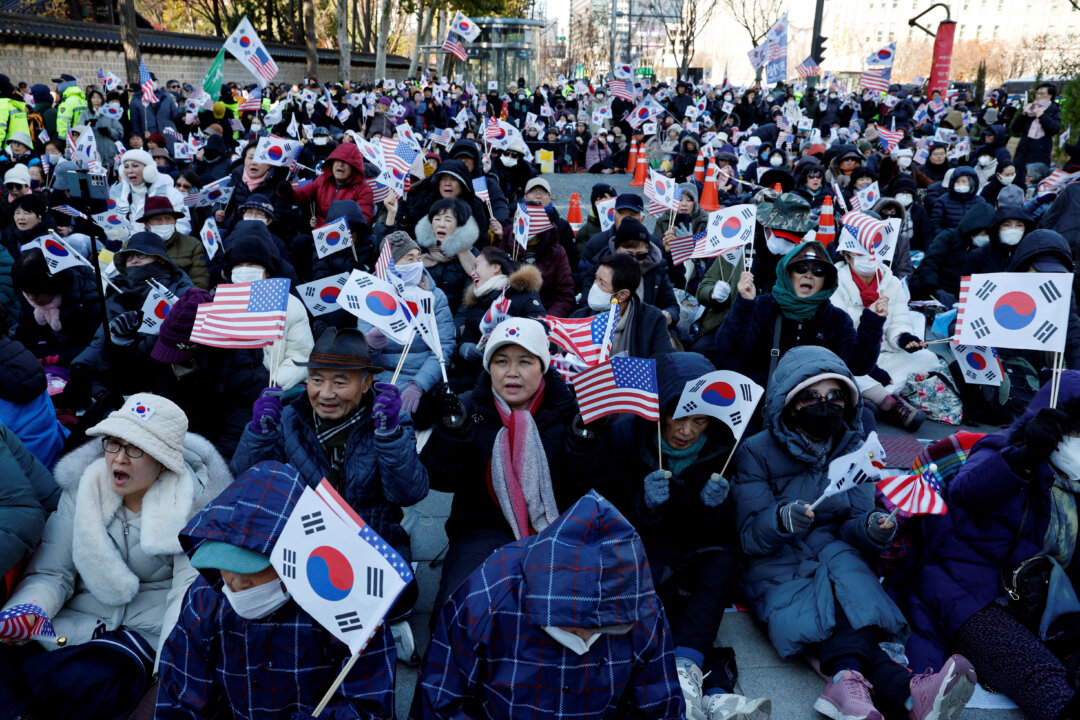South Korean prosecutors have opened a treason investigation into President Yoon Suk Yeol, his interior minister, and the former defense minister.
South Korea’s ruling People Power Party (PPP) has said it will oppose moves to impeach President Yoon Suk Yeol over his decision to declare martial law, the Yonhap news agency reported on Dec. 5.
Yoon, who was the PPP candidate when he won the presidential election in 2022, is facing an impeachment vote on Dec. 6 or Dec. 7 over his decision to declare martial law, which he later reversed.
The incident also caused alarm worldwide, particularly in the United States, which counts South Korea as a strong ally.
There has been a relatively stable government in South Korea since 1988, when democracy was restored after several years of military rule.
South Korean prosecutors have opened a treason investigation into Yoon, his interior minister, and the defense minister—who has since been replaced—over their roles in the attempt to impose martial law, Yonhap reported on Dec. 5.
The news agency said the National Police Agency’s national office of investigation began the probe after two complaints were filed, one from a small opposition party, Rebuilding Korea, and another by a group of 59 activists.
But Choo Kyung-ho, who leads the conservative PPP in South Korea’s Parliament, said the party would stay united to reject impeachment.
If at least eight of the ruling party’s representatives in Parliament vote with the opposition, the impeachment vote would be successful and Yoon would be deposed, leading to fresh elections.
The impeachment motion was introduced at a parliamentary plenary session early on Dec. 5, meaning it could be put to a vote any time between Dec. 6 and Dec. 7.
By law, if the motion is not voted on within 72 hours of its parliamentary introduction, it fails.
But opposition parties can submit a new impeachment motion if the current one runs out of time or is voted down.
Yoon, who has made little public comment since Dec. 3, has replaced Kim Yong Hyun as defense minister with Choi Byung Hyuk, a retired four-star general who is currently South Korea’s ambassador to Saudi Arabia.On Dec. 3, citing unspecified threats from “anti-state forces” within the opposition, Yoon imposed martial law but reversed the decision six hours later after demonstrators took to the streets and Parliament refused to ratify his decision.
Yoon, 63, was originally South Korea’s chief prosecutor and led an investigation into then-president Park Geun-hye, which led to her being impeached in December 2016 on charges of influence-peddling.
Park was the daughter of Park Chung-hee, an army general who led a coup in 1961 and then led South Korea through an economic boom before being assassinated in 1979.
Lee Jae-myung, 60, head of the main opposition Democratic Party, narrowly lost the 2022 presidential election but would be in pole position to win a vote should Yoon be ousted.
But on Nov. 15, Lee was convicted of violating the election law and was handed a suspended prison sentence, which if upheld could jeopardize any presidential bid. Lee has said he would appeal.

Ten days later, he was cleared of forcing a witness to commit perjury, but he still faces trial for matters relating to a $1 billion property development scandal.
A poll released on Dec. 5 by Realmeter, a pollster based in Seoul, South Korea, suggested 74 percent of South Koreans supported Yoon being impeached.
Hundreds of conservative protesters have taken to the streets of Seoul to support Yoon, who has promised to take a stronger stance against both North Korea and the Chinese regime.
The same pollsters reported on Dec. 2—before he declared martial law—that Yoon’s approval rating had fallen to 25 percent.
The Korean peninsula has been divided since the 1950s, and South Korea—officially known as the Republic of Korea—shares an uneasy, and at times deeply hostile, relationship with North Korea, which calls itself the Democratic People’s Republic of Korea, despite being led by a totalitarian communist regime.
The Associated Press and Reuters contributed to this report.

